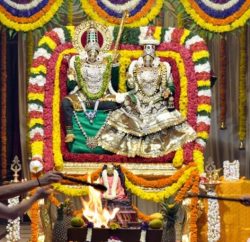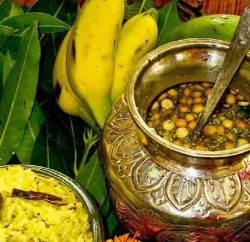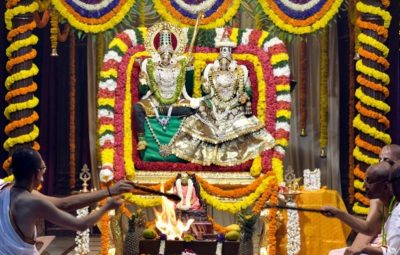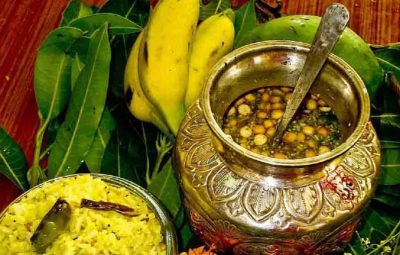Diwali, the Festival of Lights, celebrates rich traditions and the divine pastimes of the Supreme Lord, dispelling ignorance and spreading the light of spiritual wisdom and joy.
In the journey of life, spirituality serves as a guiding light, helping us to navigate challenges while offering a profound sense of purpose. It prompts reflection on goodness, humility, inner strength, and the eternal battle between light and darkness within us. Through spiritual practices, we strive to dispel ignorance and cultivate wisdom, ultimately seeking a state of enlightenment and eternal happiness by reconnecting with the Supreme Lord.
One such occasion that beautifully encapsulates these spiritual ideals is Diwali, the Festival of Lights—a celebration that illuminates not only our homes but also our hearts.
Diwali, also known as Deepavali, is a festival widely celebrated across India and many other countries with great rejoicing and enthusiasm. It takes place during the holy month of Kartika (October-November). The word Deepavali in Sanskrit means “a row or string of lights”.
Table of Contents
- 1 Diwali – A Five-Day Celebration
- 2 Dhanteras – Honouring Dhanvantari
- 3 Naraka Chaturdashi – Lord Krishna Slays Narakasura
- 4 Lakshmi Puja, Lord Krishna’s Damodara-lila and Lord Rama’s Return to Ayodhya
- 5 Govardhana Puja – Commemorating Lord Krishna’s Govardhana-lila
- 6 Bhai Dooj – Celebrating Sibling Bonds
- 7 From Darkness to Light: The Spiritual Essence of Diwali
Diwali – A Five-Day Celebration
The predominant feature of Diwali is the lighting of earthen lamps (diyas) in homes, temples, and public spaces. Fireworks enhance the joy and spirit of the occasion.
Although the festival spans five days, Diwali traditionally refers to the third day, the most significant of the five. Each day holds its own historical and cultural importance and is celebrated in various ways depending on local traditions. The festival of Diwali falls on the dark moon night of the Kartika month.
In the days leading up to Diwali, people clean, renovate, and adorn their homes and workplaces with diyas and rangolis. On Diwali, they worship Goddess Lakshmi, light fireworks, and gather for family feasts, greeting friends and exchanging gifts and sweets.
Dhanteras – Honouring Dhanvantari
The first day of Diwali is Dhanteras, also known as Dhanatrayodashi. This is a day when many purchase new items, such as utensils and gold jewellery.
On this day, some devotees worship Dhanvantari, the incarnation of the Supreme Lord as the divine physician who delivered Ayurveda, the ancient Vedic science of medicine, for the welfare of humanity.
According to legend, Dhanvantari emerged on this day carrying a jar of nectar during the churning of the milk ocean (samudra manthana) by the demigods and demons.
In some traditions, this day is also associated with the appearance of Goddess Lakshmi during the samudra manthana, and she is also venerated.
Naraka Chaturdashi – Lord Krishna Slays Narakasura
Naraka Chaturdashi, the second day, is connected to Lord Krishna’s slaying of a powerful demon called Narakasura, who had kidnapped 16100 princesses from the palaces of various kings and imprisoned them in his city.
Lord Krishna vanquished the demon and all of his army and freed the princesses. However, the princesses did not wish to return to their homes, as they would not be accepted back into society after their captivity. They desired with a sincere and devotional attitude that Lord Krishna marry them. Lord Krishna magnanimously agreed to their prayers and accepted them as His wives.
Using His inconceivable powers, the Lord expanded into as many forms as His queens to reside with each of them in their respective palaces simultaneously, acting as an ideal husband. Lord Krishna thus perfectly reciprocated their loving feelings.
This day is also popularly known as Choti Diwali.
Lakshmi Puja, Lord Krishna’s Damodara-lila and Lord Rama’s Return to Ayodhya
The third day of Diwali, the main festival day, is dedicated to the worship of Goddess Lakshmi, with people seeking her blessings for wealth and prosperity. Wealth is considered to be Goddess Lakshmi and Lord Narayana is the husband of Lakshmi. Being His eternal consort, she is meant to serve the Lord, and she cannot stay alone without Him. Understanding this relationship, devotees worship Lakshmi along with Narayana, dedicating their wealth in service to the Lord.
This day also commemorates Lord Krishna’s enchanting Damodara-lila, in which, as a mischievous child, He was bound with a rope to a grinding mortar by His mother, Yashoda, for stealing butter. Through this pastime, Lord Krishna revealed that He is bound not by strength but by the love and devotion of His pure devotees.
In this pastime, the Lord, still bound, pulled down two tall trees in the courtyard and delivered two demigods who had been cursed to become trees. These demigods became His pure devotees and attained liberation at the end of their lives.
Another historic event connected to this day is Lord Rama’s return to Ayodhya and His coronation as the emperor.
Lord Rama, along with Sita and Lakshmana, returned to Ayodhya after His victory over the demon Ravana and His 14-year exile. Upon hearing of His arrival, the entire city of Ayodhya prepared a grand welcome for the Lord. The blast of conches and the roll of drums was tumultuous. It appeared as if the entire population of Ayodhya had come out of the city, all hoping for a glimpse of Rama. The city streets were beautifully decorated with flags and garlands. Lord Rama looked around at everyone and smiled, raising His hand in blessing.
The next day, Lord Rama ascended the throne of Ayodhya in a grand coronation ceremony, taking back the charge from His younger brother Bharata who was ruling the kingdom on His behalf. The vast crowds cried out, “Victory to Rama!” and “All glories to Sita and Rama!”
Thus, the inhabitants of Ayodhya celebrated this joyful occasion with Deepavali or by lighting a string of lamps all over the city. This tradition continues, and every year, on the 20th day after Vijaya Dashami, people celebrate Diwali to mark Lord Rama’s return and His coronation.
Govardhana Puja – Commemorating Lord Krishna’s Govardhana-lila
The fourth day is celebrated as Govardhana Puja, marking Lord Krishna’s miraculous lifting of the Govardhana Hill, known as the Govardhana-lila.
This event occurred when Krishna advised the residents of Vrindavan to worship the Govardhana Hill instead of performing their traditional sacrifice to Indra, the King of Heaven. Angered by this, Indra sent a deluge of rain to flood Vrindavan. In response, Lord Krishna lifted the Govardhana Hill on His little finger, sheltering the residents and their cattle for seven days. This pastime demonstrated Krishna’s identity as the Supreme Lord and His unfailing loving care and protection of His devotees.
On this day, devotees offer Annakuta, a wide array of delicacies to Lord Krishna, and distribute them as prasadam. They also worship cows in recognition of their revered status in Vedic culture and their close association with Lord Krishna as Gopala, the protector of cows.
Bhai Dooj – Celebrating Sibling Bonds
On Bhrātṛ-dvitīyā or Bhai Dooj, the fifth day of Diwali, sisters perform a ritual involving the application of a tika (forehead mark) on their brothers, followed by a feast, and in return, the brothers present gifts and promise to protect their sisters.
The five days of Diwali are filled with spiritual remembrance and festivities, offering a time to recall the Lord’s divine pastimes and qualities of love, mercy, and protection.
From Darkness to Light: The Spiritual Essence of Diwali
The lighting of lamps during Diwali signifies the triumph of good over evil, knowledge over ignorance, and light over darkness.
The festival reflects the Vedic teaching: asato mā sad gamaya, tamaso mā jyotir gamaya. Everything in this world is temporary; therefore, this material world is called asat. The eternal spiritual world is sat.
Furthermore, this material world as a whole is described as dark. It is only due to the presence of the sun that we see light. Therefore, the Vedas direct everyone not to remain in the darkness of the temporary material world but to go to the light of the eternal spiritual abode of the Lord, which is full of knowledge and bliss.
This Diwali, let us pray to the Supreme Lord Krishna to illuminate our lives with spiritual knowledge, devotion, and surrender, guiding us on our journey in Krishna consciousness. ISKCON Bangalore warmly invites you to participate in the month-long Kartika Deepotsava festival, celebrating the Damodara-lila of Lord Krishna, and receive His abundant blessings.











